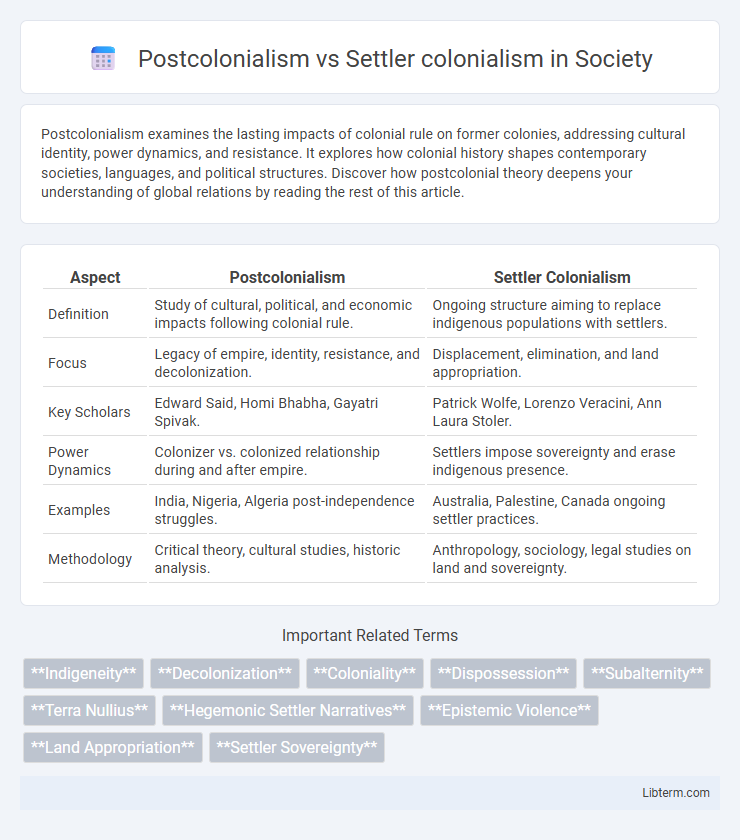Postcolonialism examines the lasting impacts of colonial rule on former colonies, addressing cultural identity, power dynamics, and resistance. It explores how colonial history shapes contemporary societies, languages, and political structures. Discover how postcolonial theory deepens your understanding of global relations by reading the rest of this article.
Table of Comparison
| Aspect | Postcolonialism | Settler Colonialism |
|---|---|---|
| Definition | Study of cultural, political, and economic impacts following colonial rule. | Ongoing structure aiming to replace indigenous populations with settlers. |
| Focus | Legacy of empire, identity, resistance, and decolonization. | Displacement, elimination, and land appropriation. |
| Key Scholars | Edward Said, Homi Bhabha, Gayatri Spivak. | Patrick Wolfe, Lorenzo Veracini, Ann Laura Stoler. |
| Power Dynamics | Colonizer vs. colonized relationship during and after empire. | Settlers impose sovereignty and erase indigenous presence. |
| Examples | India, Nigeria, Algeria post-independence struggles. | Australia, Palestine, Canada ongoing settler practices. |
| Methodology | Critical theory, cultural studies, historic analysis. | Anthropology, sociology, legal studies on land and sovereignty. |
Introduction to Postcolonialism and Settler Colonialism
Postcolonialism examines the cultural, political, and economic impacts of imperialism and decolonization on formerly colonized nations, emphasizing issues of identity, power, and resistance. Settler colonialism specifically refers to a structure where colonizers permanently inhabit and assert sovereignty over indigenous lands, often leading to displacement and erasure of native populations. Understanding these frameworks illuminates the ongoing legacies of colonial domination and the complex dynamics between indigenous peoples and settler societies.
Defining Key Concepts: Postcolonialism
Postcolonialism examines the cultural, political, and economic legacies of colonial rule and the resistance of formerly colonized societies to imperial domination. It explores themes such as identity, hybridity, and power relations shaped by historical colonization. The theory critiques colonial narratives and highlights the ongoing impacts of empire on language, literature, and social structures.
Defining Key Concepts: Settler Colonialism
Settler colonialism is a distinct form of colonialism where settlers permanently occupy and assert sovereignty over indigenous lands, aiming to replace the native population rather than merely exploiting resources. It involves structural domination and displacement, creating enduring social, political, and cultural impacts on indigenous communities. Unlike traditional colonialism, settler colonialism centers on land seizure and establishing settler societies, making it a persistent and ongoing process rather than a finite historical event.
Historical Origins and Development
Postcolonialism emerged primarily from the decolonization movements of the mid-20th century, focusing on the cultural, political, and economic legacies left by European imperial powers after formal independence. Settler colonialism, dating back to the 17th century with examples like North America and Australia, centers on the permanent settlement and displacement of indigenous populations through structural domination rather than mere extraction. The development of postcolonial theory critically examines the aftermath and resistance to colonial rule, while settler colonialism studies emphasize ongoing indigenous dispossession and sovereignty struggles.
Core Differences in Colonial Structures
Postcolonialism primarily examines the cultural, political, and economic impacts of decolonization on previously colonized nations, focusing on the struggle for identity and sovereignty after imperial rule. Settler colonialism, however, involves the permanent replacement of Indigenous populations with a settler society, emphasizing land dispossession and the erasure of native peoples as ongoing structural features rather than historical events. The core difference lies in postcolonialism addressing liberation from external domination, while settler colonialism continues through systemic occupation and indigenous displacement.
Theoretical Frameworks and Influential Scholars
Postcolonialism centers on analyzing the cultural, political, and economic legacies of colonial rule, emphasizing the subaltern's voice and identity with influential scholars like Edward Said, Gayatri Spivak, and Homi K. Bhabha, who developed key concepts such as Orientalism and hybridity. Settler colonialism, theorized by Patrick Wolfe and Lorenzo Veracini, focuses on the ongoing structure and logic of colonization where settlers seek to erase Indigenous presence to establish permanent sovereignty. Both frameworks critically examine power, resistance, and identity but diverge in settler colonialism's emphasis on spatial displacement and structural elimination of native populations.
Impacts on Indigenous Populations
Postcolonialism examines the cultural, political, and economic legacies of colonial rule affecting Indigenous populations, emphasizing struggles for identity, sovereignty, and reparations. Settler colonialism uniquely involves the displacement and systematic erasure of Indigenous peoples to establish permanent colonial societies, resulting in profound loss of land, culture, and governance. The ongoing impacts manifest through intergenerational trauma, marginalization, and resistance movements aimed at reclaiming Indigenous rights and territories.
Cultural Representations and Narratives
Postcolonialism critically examines the cultural representations and narratives shaped by the aftermath of colonial rule, highlighting themes of identity, resistance, and hybridity in formerly colonized societies. Settler colonialism focuses on the ongoing structures of power and displacement that erase Indigenous identities, depicting narratives that often normalize settler presence and sovereignty. Both frameworks analyze how literature, media, and cultural productions reflect and contest historical and contemporary power dynamics between colonizers and Indigenous or colonized peoples.
Resistance, Decolonization, and Modern Legacies
Resistance in postcolonialism often centers on reclaiming cultural identity and rewriting history, whereas settler colonialism involves ongoing displacement and erasure of Indigenous peoples. Decolonization in settler colonial contexts requires dismantling settler institutions and restoring Indigenous sovereignty, contrasting with postcolonial states' focus on political independence from imperial powers. Modern legacies of settler colonialism include persistent land disputes and systemic inequalities, while postcolonialism grapples with neocolonial economic structures and cultural hybridity.
Conclusion: Rethinking Colonial Paradigms
Postcolonialism and settler colonialism challenge traditional colonial narratives by highlighting distinct mechanisms of domination and resistance; postcolonialism emphasizes the aftermath of imperial rule, while settler colonialism focuses on the ongoing displacement of indigenous populations. Rethinking colonial paradigms requires integrating these perspectives to address both historical legacies and persistent structures of power. This approach fosters a more nuanced understanding of colonial impacts, promoting decolonization efforts that acknowledge multiple forms of coloniality and settler sovereignty.
Postcolonialism Infographic

 libterm.com
libterm.com